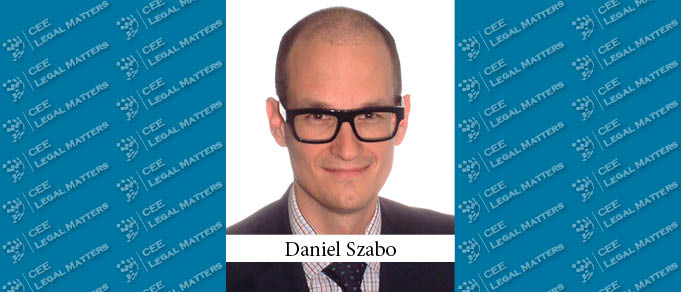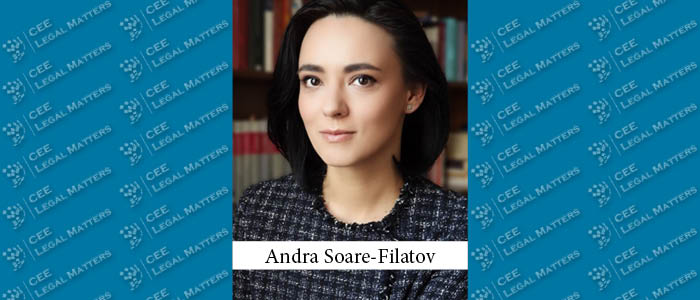A CEELM Profile of Daniel Szabo, Central Europe Team Lead at Hewlett Packard Enterprise in Budapest.
Daniel Szabo, who describes himself “a fundamentalist – a serious person with a realistic and subtle approach to life” – was born into a bilingual Hungarian-Russian family in 1981, in Budapest, but as his father was in Hungary’s diplomatic corps, he spent much of his childhood far away from Europe. Now many years into a legal career in his native Hungary, Szabo practices with a combination of intellect, commitment, and focus.
Growing Up Abroad
Szabo’s first experience outside of Magyarorszag came in the mid-1980s, when he spent four years with his family in Mongolia, which he recalls as “grey,” but remembers fondly. Altough he was young, he recalls attending a Soviet kindergarten in Ulaanbaatar and travelling around the Asian country with his parents and sister Daria in an old Land Rover the family had bought with a friend at an auction of the British Embassy.
After a few years back in Hungary, in 1992 the family moved to Nigeria, then – as now – Africa’s most populous country, with one of the continent’s largest economies. “The Hungarian embassy and the diplomats’ homes were in an old run-down building, but the location was great,” Szabo recalls. “Just on the shores of Lagos lagoon with a nice view of the water and the container ships sailing towards the city’s commercial port, as well as the Hobie Cat regatta.” Still, not everything there was idyllic. His schooling in Lagos was “an issue,” he says, and, after a year in a Russian school, his parents sent him to the French lycée, as “British or US education was unaffordable and French seemed like a good second language.”
He admits to thinking more fondly of his unusual childhood as it grows more distant in his memory. “I think an expat life, though this term is associated with high status and privilege that Eastern European diplomats did not have, does leave a deep mark on most people, irrespective of age,” he says. “Some don’t like it and don’t have good memories of it. Others might love it and feel nostalgic their whole life. I cannot say that I particularly liked living in Nigeria, but I started feeling very nostalgic as an adult.”
Upset in University
In 1996 Szabo again returned to Hungary, and several years later began attending the prestigious Eotvos Lorand University in Budapest, initially studying both Political Science and Law, before deciding to focus exclusively on the latter. That choice wasn’t easy, ultimately, and some regrets linger. Szabo describes being disappointed to find, in his law studies, a “very outdated curriculum, which hadn’t changed in a hundred years, [and] that law school in Hungary at the time was mostly based on memorizing things.” Indeed, he says, things haven’t changed much since, either: “I think that Hungarian education in general, and legal education is no exception, has a quantity over quality problem and a bias for theory over the practical application of knowledge. We are hopelessly bogged down in this mind-set.”
To this day his frustration lingers, and he admits to some regret that he turned down an opportunity to study in France: “I didn’t go to France to study because I didn’t want to have an immigrant, second-grade citizen experience,” he says. “Especially in practicing law – I didn’t want to stand out with an accent, and have people question me and my competence, because I would never be able to blend in completely.” He says, “in retrospect, I feel that not going to France may have been the wrong choice – that realization came to me when I started practicing law in Hungary. The Hungarian language is not spoken anywhere else and our school isn’t recognized elsewhere.”
Still, Szabo ultimately was able to study abroad, completing his studies in 2006 as an Erasmus student in Berlin. According to him, “German legal training had a far greater emphasis on practical knowledge. They wanted to teach you how to think as a lawyer and solve legal problems. After all, law is a way of thinking, as Professor Paulus of the Humboldt University explained during a lecture that I remember to this day.”
The Professional Step
After graduating in 2006, Szabo joined Budapest’s Nagy es Trocsanyi law firm – at the time a family-owned litigation boutique. He spent a brief six months in what he describes as N&T’s “professional business environment,” working hard to establish himself, and he recalls his excitement at the occasional opportunity to be heard in court.
After seven months at N&T, and eager to learn more about Banking/Finance and M&A work, Szabo moved to the Budapest office of Allen & Overy. Two years later he accepted an offer to move in-house with Magyar Telekom, where, he says, he was tasked with “overseeing, from a legal perspective, (i) the M&A transactions of Magyar Telekom Group and (ii) the key legal affairs of the Group’s foreign subsidiaries.”
He immediately knew he had made the right choice, and left private practice in the rear-view mirror permanently. “As a result of the roughly three years that I spent in the two law firms I understood that my strengths lie outside of what is required in a firm, which ultimately is an ability to build a business or become a black belt niche expert,” he recalls. “An in-house career, on the other hand, requires a somewhat different skill set and offers perhaps more fluidity: ease of navigating cultures, businesses, seeing legal problems in the wider context, bridging gaps and collaborating across functions, innovating and adapting fast.”
In 2013, after five years with Magyar Telekom, Szabo learned of an open position at Hewlett-Packard. He leapt at the opportunity – a move he describes as his “best career development decision” – and in January 2014 he became Country Counsel for Hungary, immediately feeling at home. “HP offered what I needed in terms of the next building block in my career, overseeing the legal affairs of a country operation event if that essentially meant a sole counsel position. Although HP Hungary was and still is a much smaller operation than MT I still consider this experience very valuable. Being a small unit in a big multinational has its advantages. A closer integration into the fabric of the company provides you with more international opportunities. I can say that by now most of my work is related to matters outside of Hungary.”
The role also provided him with the leadership position he wanted, allowing him to mentor people and teach them the values of sacrifice and hard work he had long prized. Hewlett-Packard obviously realized his value as well, and quickly moved him up the ladder: In 2016 he became Country Counsel Hungary & Azerbaijan; in 2017 South-East Europe Counsel; and in January 2019 he assumed his current position as Central Europe Team Lead, coordinating the legal department’s work in the Czech Republic, Hungary, Poland, Slovakia, and Romania.
He declares himself content at HP. “HP is a company that invests in you and gives you new challenges,” he says. “All of that doesn’t happen overnight, of course, but it does eventually. Here, you can try different tasks, and there are plenty of opportunities. The company is financially mindful and constantly tries to motivate its employees. All in all, it’s an inspiring environment, and a good one to be in.”
He says he now finds it difficult to imagine himself in another career. “I consider myself lucky,” he says, deflecting a compliment about his rapid ascent at HP. “I have had great employers and managers throughout my career. I have been in-house for more than ten years now and consider this career path a more natural fit than private practice, which I experienced only briefly.”
And his peers – including Hewlett Packard Country Counsel for Poland, Maja Galecka-Wasowicz – agree he’s in the right place. “Daniel is a real hard worker, full of passion for his work and his customers,” she says. “He has deep knowledge and a strong will to grow in all kinds of ways, to become a better advisor for his customers and colleagues.” She smiles. “It’s a pleasure to work with him.”
The Home Life
Szabo lives in Budapest with his wife and – with the recent birth of a baby girl making the already-memorable spring of 2020 even more so – three children. He spends a great deal of his free time with his family, he says, and he enjoys exercising and a recently-rediscovered love for pre-digital photography.
Daniel is not the only Szabo to practice law, as his sister Daria is a Senior Associate at Bird & Bird. In addition, he says, his grandfather earned a degree in law, though he never practiced.
“I don’t have any position or title in mind in terms of what’s next,” Szabo says, modestly. “I enjoy working on international assignments of company-wide significance and hope to be included in more of those going forward.”
This Article was originally published in Issue 7.5 of the CEE Legal Matters Magazine. If you would like to receive a hard copy of the magazine, you can subscribe here.
























